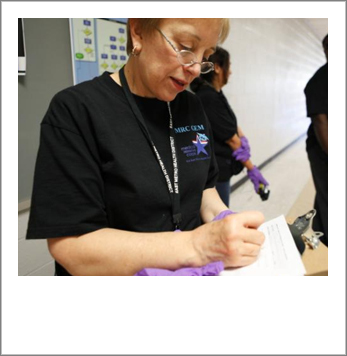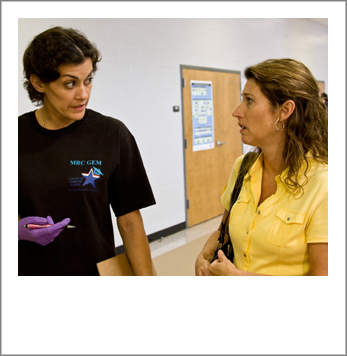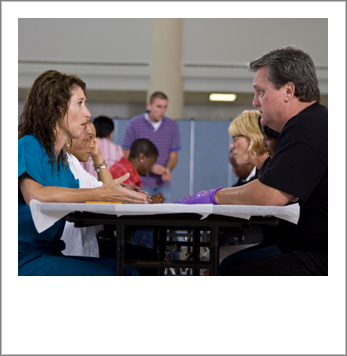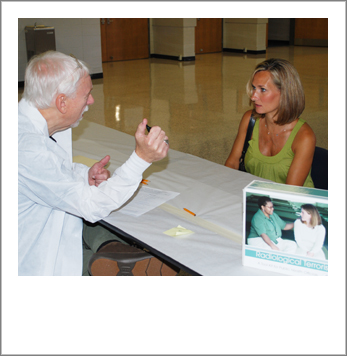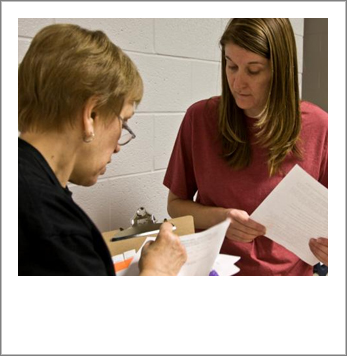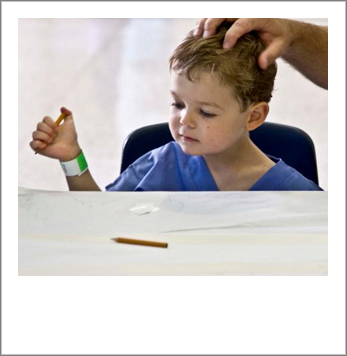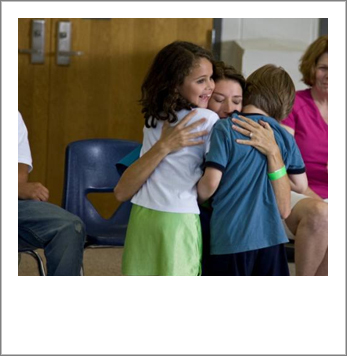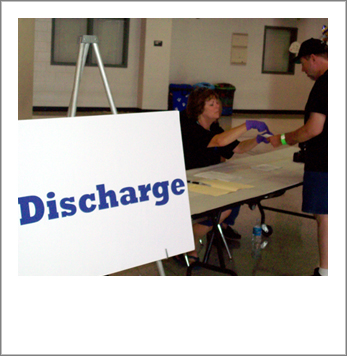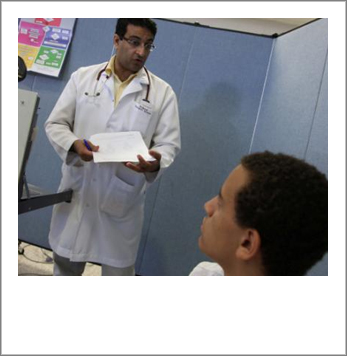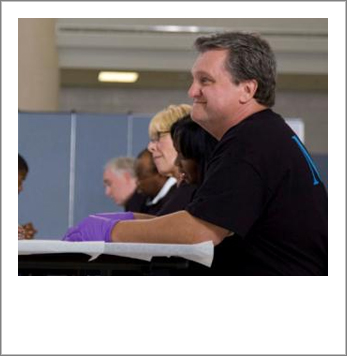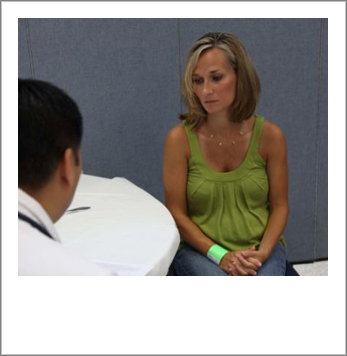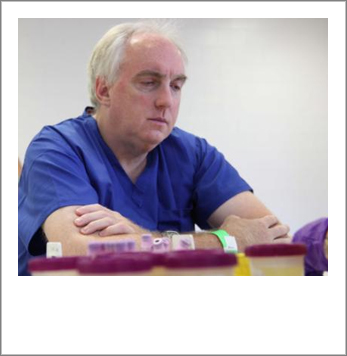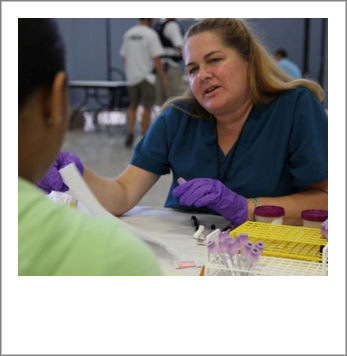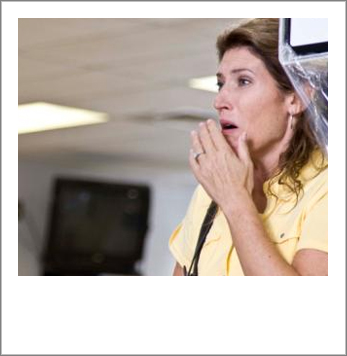Pychological First Aid Steps
Now that you have a better idea of the needs and typical responses of a disaster survivor, what can you do to help? You actually already have many essential attributes and skills that you can bring to assist survivors! They are basic skills that help us in relating to family, friends, and work colleagues - many are common sense.
As you can imagine, good listening skills, patience, and a caring attitude are invaluable in working with disaster survivors. Trustworthiness and being approachable, culturally sensitive, and non-judgmental are other essential attributes and skills. And finally, the ability to be flexible and tolerant in the inevitable chaos created by a disaster event is obviously critical in successfully working with survivors.
As a responder in a radiation disaster, there are several steps you can take in providing psychological first aid to survivors. First and foremost, you must get the person to actively engage with you. Introducing yourself and stating your intent should also occur immediately. Once you have engaged the survivor, you can best help by being an attentive listener and being “present” with the survivor.
Trying to think of a response or solution to his or her immediate problem while the person is still talking will only interfere with this process. It is more important to attend closely to what the person has to say than to present an immediate solution. It is when you are truly “with” a person that you will be able to pick up on his or her behaviors, attitudes, and needs.
In addition, you can promote safety, calm, connectedness, self-efficacy, and help. Let’s look at each of these.
Promote safety. You can do this by helping people meet their basic needs. You also promote a sense of safety by providing repeated, simple, and accurate information on how survivors can get their basic needs met.
Under highly stressful situations it is difficult for people to follow complex directions. Diplomatically asking the person to repeat your instructions “to be sure I gave that to you correctly” can be a good means of ensuring the message was received.
Promote calm. Disasters create anxiety. Being calm yourself and creating an atmosphere of calmness can go a long way in helping. You can promote calmness by listening to people who wish to share their stories and emotions. Do not force people to share if they are not ready to do so. As people are talking, remember that there is no right or wrong way to feel.
You can be compassionate and friendly to people even if they are being difficult. It is also calming to offer accurate information about disaster and relief efforts underway to help survivors understand the situation. Rumors can cause anxiety. Giving accurate information to thwart rumors is an important strategy in promoting calmness.
Promote connectedness. You can also help by keeping families together and children with their parents or other relatives whenever possible.
Promote self-efficacy. Self-efficacy is the sense of power or control people feel they have. Often a disaster strips individuals’ sense of personal control. You can help by “giving” control back or empowering survivors. You can do this by giving them practical suggestions that steer them toward helping themselves and by engaging survivors in meeting their own needs.
Promote help. You can do this by finding out types and locations of services that are provided as part of the disaster response; then you can direct people to those available services. If survivors are expressing fear or worry, remind them that more help is on the way. But only say this if only if you know that is in fact the case. Never make a promise you cannot keep.
We have just reviewed a number of ways you can help in providing psychological first aid. We need to take a minute to look at a few things you should not do while working with survivors.
First and foremost, do not force people to share their stories with you; it can re-traumatize them. They will offer to share their story when they are emotionally able and ready to share it with you.
Next, do not give simple reassurances like, “Everything will be OK" or “This will be over before you know it.” These statements might make you feel better, but they are not helpful for the survivor and often are not true. For the survivor, things aren’t OK and won’t be OK for some time. It's much better to listen empathetically and just “be” with them.
It is always inappropriate to explain why you think they have suffered. A survivor may even try to get you to make a hypothesis on why the event occurred. You might respond that you don’t know what caused the disaster but that you do know that you are very sorry that it happened. And then return to helping the survivor deal with her or his immediate concerns.
It is easy in a disaster situation to make promises to survivors that cannot be kept. We think that we are bringing hope and being helpful if we can tell survivors what they want to hear, but it is never the right or best thing to do if those promises cannot be kept. It backfires and ultimately causes a lack of hope and distrust of you and the system. It is always more helpful to provide accurate facts as you know them.
Finally, never criticize existing services or relief efforts in front of people in need of those services. Tension is high in a disaster response, and, as we have witnessed in past disasters, there are problems in communication and provision of services to survivors. In other words there is plenty to complain about but criticizing these services and relief efforts in front of the survivors is never beneficial. Survivors are better served when those helping them portray a unified effort.
What can you do to help?
You actually already have many essential attributes and skills that you can bring to assist survivors:
- Good listening skills
- Patience
- A caring attitude
- Trustworthiness
- Being approachable
- Cultural sensitivity
- A non-judgmental attitude
- Flexibility and tolerance during chaos
There are several steps you can take in providing psychological first aid to survivors:
- Get the person to actively engage with you
- Be an attentive listener
- When you are truly “with” a person, you will be able sense behaviors, attitudes, and needs
- Promote:
- SafetyCalm
- Connectedness
- Self-efficacy
- Help
Promote safety by:
- Helping people meet their basic needs
- Providing repeated, simple, and accurate information
Asking the person to repeat your instructions can be a good means of ensuring the message was received.
Promote calm by:
- Being calm yourself
- Listen to people who wish to share their stories and emotions
- Be compassionate and friendly to people even if they are being difficult
- Offer accurate information about disaster and relief efforts
Promote connectedness:
- Keep families together when possible
Promote self-efficacy:
- Empower survivors to give them a sense of control
- Give practical suggestions that steer them towards helping themselves
Promote help:
- Find out types and locations of services that are provided
- Direct people to those services
Take a minute to look at a few things you should not do while working with survivors:
- Do not force people to share their stories with you
Take a minute to look at a few things you should not do while working with survivors:
- Do not give simple reassurances like, “Everything will be OK”
- Do not try to “explain” why you think they have suffered
It is easy in a disaster situation to make promises to survivors that cannot be kept.
Unkept promises backfire and create distrust in you and the system. Provide accurate facts as you know them.
Never criticize existing services
- Survivors are better served by portrayal of a unified effort


